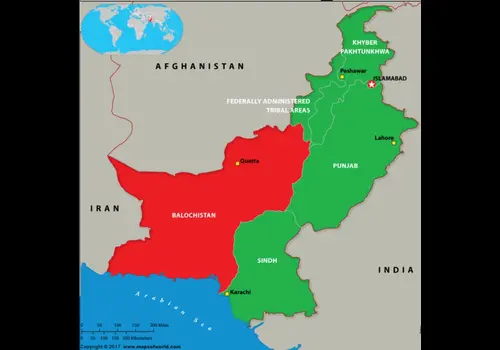The princely state of Kalat, located in present-day Balochistan, was one of the largest and most strategically significant states in British India. It had a long history of sovereignty, dating back to 1666, and was recognized as an independent state by the British through the Treaty of Kalat of 1876. After the partition of India in 1947, Kalat sought to remain independent, but its fate took a controversial turn, leading to its integration into Pakistan.
Balochistan’s (Kalat) Desire for Independence
- Historical Sovereignty: Kalat had a unique status as a sovereign entity, with its own parliament (Dar-ul-Awam) and a ruler known as the Khan of Kalat.
- Post-Partition Aspirations: In August 1947, the Khan of Kalat, Mir Ahmad Yar Khan, declared Kalat’s independence, citing its historical autonomy and the lapse of British paramountcy.
- Support from Baloch Tribes: The Baloch tribes, proud of their distinct identity, supported the Khan’s decision to remain independent.
Broken Promises: The Initial Stand of Pakistan
- Standstill Agreement (August 1947): Pakistan signed a standstill agreement with Kalat, recognizing its independence and agreeing to negotiate future relations.
- Promise of Sovereignty: Muhammad Ali Jinnah, the founder of Pakistan, initially assured the Khan of Kalat that Pakistan would respect Kalat’s independence.
Deception and Intimidation: The Coercion of Balochistan/Kalat
- Changing Stance of Pakistan: By late 1947, Pakistan began pressuring Kalat to join the federation, despite the earlier agreement.
- Military and Diplomatic Pressure: Pakistan deployed troops near Kalat’s borders and used diplomatic channels to isolate the state.
- Internal Divisions: Some pro-Pakistan elements within Kalat, including the ruler’s younger brother, Prince Abdul Karim, began advocating for integration.
The Treacherous Annexation: Forced Integration and the Spark of Resistance
- Forced Accession (March 27, 1948): Under immense pressure, the Khan of Kalat signed the Instrument of Accession, integrating Kalat into Pakistan.
- Lack of Consent: Many Baloch leaders and tribes rejected the accession, claiming it was done under duress and without the consent of the people.
- Armed Resistance: In 1948, Prince Abdul Karim led a rebellion against Pakistan, but it was eventually crushed by the Pakistani military.
Legacy of Injustice: Resentment and the Struggle Against Exploitation
- Loss of Autonomy: Kalat lost its sovereignty and became part of Pakistan’s Balochistan province.
- Ongoing Resentment: The forced integration left a legacy of resentment among the Baloch people, who continue to demand greater autonomy and rights.
- Historical Debate: The annexation of Kalat remains a contentious issue, with many historians and Baloch nationalists viewing it as a betrayal of trust.
From Rebellion to Revolution: The Birth of the Baloch Liberation Army
- Roots in Historical Grievances: The forced annexation of Kalat in 1948 is often cited as one of the key historical grievances that fuel the Baloch independence movement today.
- Emergence of the BLA: The Baloch Liberation Army (BLA), formed in the early 2000s, is one of the most prominent armed groups fighting for Baloch independence. It draws inspiration from the resistance led by figures like Prince Abdul Karim in 1948.
- Modern-Day Struggle: The BLA and other Baloch nationalist groups argue that the Baloch people were never given the right to self-determination and that their resources are being exploited by the Pakistani state without fair compensation.
- Continued Conflict: The BLA has been involved in armed clashes with Pakistani security forces, targeting infrastructure projects and military installations, which they view as symbols of oppression and exploitation.
The Unending Struggle for Baloch Identity and Freedom
- The integration of Kalat into Pakistan was a complex and controversial event, marked by broken promises and coercion.
- While Pakistan viewed it as a necessary step for national unity, the Baloch people saw it as a violation of their rights and sovereignty.
- The story of Kalat serves as a reminder of the challenges faced by princely states during the partition and the lasting impact of political decisions on regional identities.
- The modern-day Baloch Liberation Army (BLA) is a direct reflection of the unresolved grievances stemming from the annexation of Kalat, highlighting the enduring struggle for Baloch rights and autonomy.
For overall understanding of separatist groups in Pakistan, you can refer to article–https://upscmatters.com/terrorism-and-separatism-in-pakistan/
If you found this helpful, you might also like these articles:
📌 [https://upscmatters.com/indus-valley-civilization/ ]
📌 [https://upscmatters.com/rakhine-crisis-a-geopolitical-flashpoint/]
They cover key concepts that will boost your preparation! 🚀
📢 Stay Updated with the Best UPSC Resources!
Join our Telegram Channel for:
✅ Daily Current Affairs
✅ Important Notes & PDFs
✅ Answer Writing Tips
✅ Strategy & Motivation
📲 Click the link to join now: [https://t.me/upscmatters] or [https://t.me/ramsirnotes]
Don’t miss out on valuable updates!


2 thoughts on “Balochistan Lost Independence: The Treacherous Annexation by Pakistan”